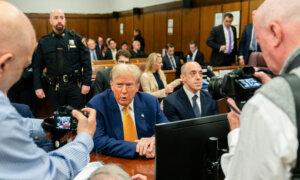‘I’m not allowed to testify because this judge, who’s totally conflicted, has me under an unconstitutional gag order,’ former President Donald Trump said.
Former President Donald Trump gave a substantially different answer when asked on May 2 whether he would testify in his own defense at trial.
“Well I’m not allowed to testify, I’m under a gag order,” he told reporters before leaving court on Thursday afternoon.
On several previous occasions, President Trump’s response was an emphatic “yes” when asked the same question.
This change came the same day New York Supreme Court Justice Juan Merchan held a second hearing over whether President Trump violated his gag order.
“We’re going to be appealing the gag order. I’d love to answer that question, it’s a very easy question, the easiest question, but I’m not allowed to testify because this judge, who’s totally conflicted, has me under an unconstitutional gag order,” President Trump told reporters.
“Other people are allowed to do whatever they want and I’m not allowed, as a presidential candidate, the leading candidate, the Republican candidate nominee and the one who’s leading Biden by a lot, and I’m not allowed to talk,” he said.
Gag Order Penalties
President Trump has been on trial since mid-April for allegedly falsifying business records in what the Manhattan District Attorney claims was a scheme to influence the 2016 election.
Prosecutors kicked off the trial by accusing President Trump of violating his gag order via three social media posts, adding another seven to the list days later. On April 23, the parties argued over the 10 posts, and on April 25 Justice Merchan found President Trump violated the gag order in nine of those posts, ordering their deletion and a $9,000 fine.
On May 2, the judge held another hearing over four additional instances where President Trump spoke to the press and referenced the case. He has not yet issued a decision.
The gag order does not prohibit President Trump from testifying, but bars him from making statements about jurors, witnesses, court staff, counsel excluding Manhattan District Attorney Alvin Bragg, and the judge and district attorney’s family members, if made to materially interfere with the case proceedings.
President Trump’s comments referring to Michael Cohen, a key witness in the case and vocal critic of President Trump, including links to others’ commentary about Mr. Cohen, were deemed violations of the gag order.
The judge also declined to review articles President Trump wanted to post on social media, and stated he believed his order was not ambiguous.
Trump Testimony
President Trump previously took the witness stand in a high-profile civil case against him that resulted in a $454 million judgment he is now appealing.
State attorneys had a difficult time guiding the former president during questioning, as he often gave long, elaborate descriptions when asked about his properties, which were at the center of the case.
President Trump’s testimony last fall frustrated the judge presiding over the case several times, as New York Supreme Court Justice Arthur Engoron asked defense counsel repeatedly to “control” their client. He also warned President Trump against campaigning in the courtroom, though toward the end of President Trump’s testimony, he still made claims the case against him was politically motivated and meant as “election interference.”
President Trump then told reporters at a press conference that he planned to testify in another then-upcoming civil trial, brought by writer E. Jean Carroll for defamation, as well as his criminal trials because he maintained he “did nothing wrong.”
He further explained that he had been advised by counsel not to testify previously, and the presiding judge was very “hostile” in his absence. He has said in interviews and press conferences he will testify in his criminal cases.
After his first testimony, U.S. District Court Judge Lewis Kaplan set stricter limitations on what President Trump would be allowed to say during the defamation trial in January. He permitted five minutes during closing arguments, and warned that President Trump would not be allowed to make a campaign speech.
Justice Merchan has already issued rulings that could limit what President Trump can say in the courtroom.
He barred the defense from making arguments that the case was timed for election interference or making reference to a book by Mark Pomerantz, who left the district attorney’s office in what he claims was protest when the office would not prosecute President Trump on certain financial crime charges. President Trump and his allies, including House Republicans who recently opened an investigation, have claimed the book outlines how the case is politically motivated.
The defense has also been limited from arguing that the Federal Election Commission previously declined to bring charges on the matter, as the judge deemed it “irrelevant.”
Original News Source Link – Epoch Times
Running For Office? Conservative Campaign Consulting – Election Day Strategies!


